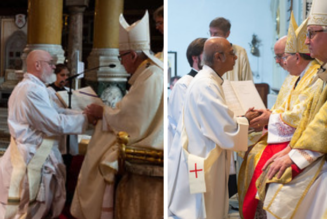By Dr. Jeff Mirus ( bio – articles – email ) | Aug 09, 2024
My title question masks a deeper one which is perhaps more to the point. Are the indifference and even hostility to Christ so great in the world today that we are excused from meeting the challenges of raising our children Catholic, seeking to deepen the faith and commitment of our fellow Catholics, and attempting to evangelize others in the midst of a secular culture that is just not interested? I suppose this question answers itself except for one thing: Do not many of us at least secretly believe that the contemporary culture of the West is so uniquely uninterested and even hostile to Christ that it is all but pointless to engage in any sort of mission?
What got me thinking about this again yesterday was the announcement of a new book from Ignatius Press (Catholic Evangelization: Stories of Conversion and Witness by Steve Dawson), of which I have requested a review copy. I do know that some people are very good at the personal evangelization of others (FOCUS is one of several other fine examples), and I also know that I am (for better or worse) far more comfortable with the idea of strengthening the Church and fostering Catholic mission through an Internet apostolate—which in comparison with some other sorts of efforts already sounds too much like an admission of guilt.
But the point of today’s reflection is to address the perception—which I believe is very widespread—that we live in a unique cultural situation, a situation in which indifference and even hostility to Christianity are so culturally-rooted that the time is not at all ripe for evangelization or any uniquely Christian mission: In other words, that there is nothing to be gained by trying, which would mean, of course, that we are excused from the effort. This point of view is, I believe, quite common for two reasons: First, there is still an eerie sense that we have gone from a thoroughly Christian culture to a thoroughly secular culture in the space of the last two or three generations. In other words, we have a dreadful sense that the “Christian era” has ended. Second, we often believe that the secularist chasm into which we have fallen is unprecedented—too deep to climb out.
Misconceptions
This affects us in many ways. It is even a (minor) factor in the very positive and certainly brilliant book Restoring the Lord’s Day by Daniel Fitzpatrick (as I mentioned last May in Remember the sabbath day, to keep it holy), in which the author spends perhaps too much time in discussing the “unique” features of our modern culture (such as an interest-based economy) which contribute to our contemporary Christian apathy, or acedia. There are no doubt features in every culture that particularly discourage us, but the very first misconception about the possibility of evangelization and apostolate in the modern world is to think that we face an unprecedented set of conditions which make any sort of Christian effectiveness utterly impossible.
In a new collection of brief passages of wisdom from Pope Benedict XVI (God Is Ever New: Meditations on Life, Love, and Freedom, from Ignatius Press), the late Pope offers this bit of wisdom in an excerpt appropriately entitled “In Temptation, God Is at Stake”:
The tempter is cunning. He does not directly impel us toward evil but rather impels us toward a false good, making us believe that the true realities are power and everything that satisfies our primary needs. In this way, God becomes secondary; he is reduced to a means. In short, he becomes unreal, he no longer counts, he disappears. Ultimately, in temptation faith is at stake, because God is at stake. [p.58]
What this suggests to us, of course, is that our perception of the unique impossibility of fruitful Catholic witness today is actually a temptation, a mere trick of the Father of Lies. Its particular premises in our lives today may be exploded through a series of pointed questions. Thus:
Do we really believe that God was deeply and personally respected in the West in the mid-twentieth century (in other words, before the very rapid institutional secularization that emerged triumphant in the 1960s)? In a society which was so prone to fall into absurd socio-political ideologies? In a society which could almost universally approve the use of atomic bombs against large civilian populations in World War II? In a society which had already for a generation or more harbored secularist intellectuals in its universities and colleges, including Modernists (at least in closet form) in Catholic universities and colleges? In a society which stopped opposing divorce as soon as the pressure for it began to grow? In a society which turned massively to contraception as soon as the Pill was developed, and thence to widespread abortion over the next few years? And even in a Church which was shaken to its very foundations almost instantaneously in the 1960s just as soon as the attitudes permissible in the dominant culture began to shift? Is it the outward forms of that 1940s and 1950s society which make us imagine things have changed so much in the recent past as to render effective Christianity impossible today?
The deeper reality
What has happened to us today is mostly that the forces of evil (either lazily materialistic or fully diabolical) are no longer hidden under an inherited veneer of cultural propriety. I do not claim that this is an insignificant development; I simply claim that it is primarily a matter of the deep problems which had long afflicted the West coming out into the open, just as they had come out into the open in particular preparatory flashes in the totalitarian secularisms of the French Revolution, Communism, and Naziism—so that now what we are experiencing in a somewhat softer form is simply the public legitimization of secularist viewpoints which have been splintering the West since the transition from the High Middle Ages to the so-called Renaissance.
Moreover, even if we look back to the Age of Christendom, what we find (along with so much public good encouraged by the influence of the Church) is chronic worldly corruption in a Church led by worldly aristocratic bishops and largely ignorant parish priests. Many wonderful outward forms were in place, and many genuine Christian achievements were characteristic of that culture, but we must recall the number of reform movements (including many new and reformed religious orders and particular saints) which kept that particular Christian and “Churchy” culture from being even more rapidly destroyed by the widespread corruption even in the Church’s own institutions.
And so it goes, back to the time of Christ Himself. At some times the outward forms have been absent, but the fervor of the faithful relatively strong, while at other times the outward forms have been very much present, but the fervor of the faithful was often falsely sustained by mere cultural habits. A period of Catholicism through and through, without serious blemishes introduced by her members from head to toe, has never existed in the Church, let alone in the surrounding culture. This does not mean that some periods and places have not been better off than others; but it does mean that we dare not presume that our difficulties in the West today are so uniquely horrible as to render apostolic witness so pointless that it may be considered not worth the trouble.
A closing example
Our times and our culture are not uniquely horrible, are not uniquely impervious to grace. What I mean especially in making this point is that we may not use our cultural situation as an excuse to avoid evangelization, avoid mission, avoid Christian witness, avoid apostolic work, or avoid bearing witness to the truth in all the ordinary features of our own daily lives and the daily lives of our families. This is a question of living out our baptism. The specific form taken in each person’s life will be different, and it is always permissible to exercise an authentic prudence. But the substance of it must be the same: The substance of it must be union with Jesus Christ, visibly manifest, and lived whenever possible in and through the explicit ministry of Christ’s Church.
Now, lest anyone still harbor the suspicion that our times are something new under the sun, and that the special circumstances of cultural faithlessness today permit widespread dereliction of what would otherwise be Christian duty, I invite you to consider the second chapter of the Biblical book called the “Book of Wisdom” or “The Wisdom of Solomon”, which was written in Alexandria, Egypt two millennia ago, very close to the birth of Christ Himself. Here are excerpts from a portrayal of the mindset of the unrighteous that demonstrate how wrong it is to consider our cultural situation uniquely evil, uniquely incompatible with the light of Christ and His Church:
[2] “[W]e were born by mere chance,
and hereafter we shall be as though we had never been;
because the breath in our nostrils is smoke,
and reason is a spark kindled by the beating of our hearts.
[3] When it is extinguished, the body will turn to ashes,
and the spirit will dissolve like empty air….[6] “Come, therefore, let us enjoy the good things that exist,
and make use of the creation to the full as in youth.
[7] Let us take our fill of costly wine and perfumes,
and let no flower of spring pass by us.
[8] Let us crown ourselves with rosebuds before they wither.
[9] Let none of us fail to share in our revelry,
everywhere let us leave signs of enjoyment,
because this is our portion, and this our lot….
[11] But let our might be our law of right,
for what is weak proves itself to be useless.[12] “Let us lie in wait for the righteous man,
because he is inconvenient to us and opposes our actions;
he reproaches us for sins against the law,
and accuses us of sins against our training.
[13] He professes to have knowledge of God,
and calls himself a child of the Lord.
[14] He became to us a reproof of our thoughts;
[15] the very sight of him is a burden to us,
because his manner of life is unlike that of others,
and his ways are strange….[17] “Let us see if his words are true,
and let us test what will happen at the end of his life;
[18] for if the righteous man is God’s son, he will help him,
and will deliver him from the hand of his adversaries.
[19] Let us test him with insult and torture,
that we may find out how gentle he is,
and make trial of his forbearance.
[20] Let us condemn him to a shameful death,
for, according to what he says, he will be protected.”
Sound Off! CatholicCulture.org supporters weigh in.
All comments are moderated. To lighten our editing burden, only current donors are allowed to Sound Off. If you are a current donor, log in to see the comment form; otherwise please support our work, and Sound Off!

There are no comments yet for this item.










